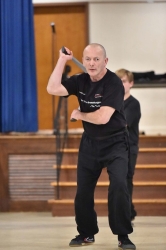
Kung Fu Legend Wong Fei Hung
Wong Fei Hung is a legendary figure in the pantheon of Chinese martial arts heroes. His life and exploits have transcended the boundaries of historical fact to become a cornerstone of folklore and popular culture. Born in 1847 in Foshan, Guangdong, China, and passing away in 1925, his life spanned a period of great turmoil and transformation in China. This makes his story a compelling reflection of the nation’s evolving identity during those times.

Early Life and Background
Wong Fei Hung was born into a martial arts family; his father, Wong Kei Ying, was one of the Ten Tigers of Canton, a group of the top ten martial artists in the Guangdong province. Under his father’s rigorous training, Wong Fei Hung mastered the Hung Gar style of kung fu, a style known for its strong stances and powerful, sweeping movements. This foundation not only made him a formidable martial artist but also a respected teacher and practitioner of traditional Chinese medicine.
Contributions to Martial Arts
Wong Fei Hung’s contributions to martial arts are profound. He refined and popularized several techniques in Hung Gar, emphasizing the importance of “moral hands,” which entailed using martial arts skills for just causes and protecting the weak. His teaching philosophy extended beyond mere physical training, incorporating ethical lessons and life skills, which made him a revered figure among his peers and students.
He is also credited with the creation of several martial arts forms, including the famous “Tiger Crane Paired Form Fist,” which synthesizes the ferocity of the tiger and the grace of the crane, reflecting his deep philosophical beliefs in balance and power.
Medical Practice
Apart from his martial arts prowess, Wong Fei Hung was a skilled practitioner of traditional Chinese medicine. He ran Po Chi Lam, a clinic in Foshan where he treated countless patients, earning a reputation for his compassionate care and profound medical knowledge. His dual roles as both a healer and a martial artist underscored his belief in the interconnectivity of physical health and moral well-being.
Social Impact and the Qing Dynasty
Wong Fei Hung’s life was not just about personal achievement; it was deeply intertwined with the social issues of his time. The late Qing Dynasty was marked by political corruption, foreign encroachment, and social unrest. He often found himself in the middle of these tumultuous events, using his skills to defend his community and stand up against injustice. His life and actions reflected the ideals of loyalty, righteousness, and courage—values deeply embedded in Chinese culture.
Legacy in Film and Popular Culture
Perhaps no other figure from Chinese martial arts history has been as widely portrayed in film and television as Wong Fei Hung. With over 100 films and numerous television series depicting his exploits, Wong Fei Hung has been immortalized by actors such as Kwan Tak-hing, Jet Li, and Jackie Chan. These portrayals have varied from historically grounded to highly fictionalized, demonstrating the flexibility of his legend as a cultural symbol.
These films and shows have played a significant role in shaping the modern perception of Wong Fei Hung, transforming him into a symbol of justice and national pride. They have also been instrumental in spreading knowledge of Chinese martial arts globally, inspiring countless individuals to learn about and practice kung fu.

Influence on Modern Martial Arts
Wong Fei Hung’s teachings and philosophy continue to influence modern martial arts, not just within the realm of Hung Gar kung fu, but across various martial arts disciplines worldwide. His emphasis on moral integrity, discipline, and the social responsibilities of martial artists resonate today, offering a holistic approach to martial arts that goes beyond physical prowess.
The man, the myth, the legend
Wong Fei Hung remains a towering figure in the history of Chinese martial arts and a national hero in China. His life story encapsulates the virtues and struggles of his times, serving as a bridge between the past and the present. As China continues to navigate its path on the global stage, the story of Wong Fei Hung serves as a reminder of the enduring values and the spirit of resilience that define the cultural heritage of the nation. His legacy, perpetuated through film, literature, and ongoing martial arts practice, continues to inspire and influence, making him an immortal figure in the annals of history and culture.
- Wong Fei Hung – The man, the myth, the legend - May 9, 2024
- Writing for Martial Journal; From the Editor - April 29, 2024
- Katheryn Winnick: A Warrior on Screen and in Life - April 14, 2024

Leave a Reply